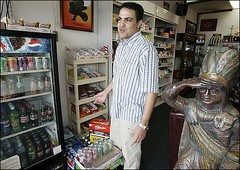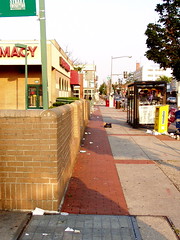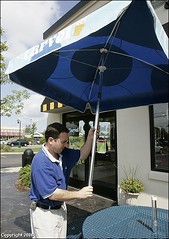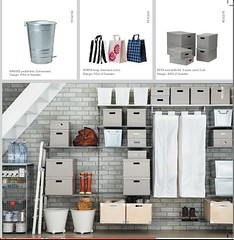Why would marginal, convenience businesses expect an uptick in business from proximity to an Ikea
In this article from the Detroit News, "Neighbors still await 'Ikea effect': Weeks after opening, businesses near furniture giant in Canton Twp. report no change in customer traffic", businesses like a car wash, a cigarette store, and an ice cream shop lament that they haven't seen an increase in business.
Ikea is an experience, not just a store. They work to keep you there the entire time you go out shopping. They have their own restaurant, they have a play area for children.
It's sleek and cool and big. And you buy a lot of stuff and then you immediately want to go home and put it together. You don't want to stop and get your car washed, and you probably don't smoke... If you want something to drink, it'll probably be a ligonberry soda, to go along with your Swedish meatball platter.
 David Coates /The Detroit News. H & I Smokers cashier Mike Nehdi said the store hasn't seen more business since Ikea opened.
David Coates /The Detroit News. H & I Smokers cashier Mike Nehdi said the store hasn't seen more business since Ikea opened.This is probably an example of unsound business development advice from cheerleader types, not analysts. E.g., new condominiums in neighborhoods don't generate much new business for stores that are dirty and offer very little in terms of quality or uniqueness.
Prospects aren't willing to wait for a store to move upwards towards their expectations, they merely go to a store that already meets their expectations. That could be elsewhere in the neighborhood; it could be where they are already comfortable shopping.
This relates to what I call The "soft side" of commercial district competition. But I have a bad habit of thinking that certain points are so obvious that they don't need to be laboriously drawn out (unlike my blog entries) so I don't state certain ur-principles.
One is the quality of what you do and what you offer. New quality businesses help drive some business to old quality businesses, but not to old average businesses. (And it really depends on the site design and whether or not it adheres to pedestrian-based urban design principles.)
_____
From that entry:
This is why I talk about "soft aspects" in relation to the Reilly Law of Retail Gravitation:
(1) the quality and condition of the buildings;
(2) the cleanliness of the street and sidewalks;
(3) the condition of the street furniture, treeboxes and other aspects of the physical environment;
(4) the signage and windows of the businesses;
(5) the quality and organization of the store interiors;
all influence whether or not people will choose to shop in your commercial district, or if they will merely continue to shop elsewhere because you provide no compelling reason for them to change their minds, attitudes, habits, and comfortability.
These factors plus the number and quality of stores and the issue of how to get there are the primary considerations influencing people's decisions about where to shop, eat, or play.
People compare our neighborhood and downtown commercial districts to shopping centers or to the best-in-class traditional commercial districts in your region. So to be equally competitive, we have to do many of the same things the shopping centers do, and primary is to provide a clean environment.
Litter, loitering, and a sub-standard physical environment aren't competitive advantages.
 H Street Connection Photo by Elise Bernard.
H Street Connection Photo by Elise Bernard.  Gary Krone, owner of Carvel Ice Cream shop in Canton Township, said he opened the shop because he knew it would be near Ikea. Krone says he hopes to see more business. Detroit News photo
Gary Krone, owner of Carvel Ice Cream shop in Canton Township, said he opened the shop because he knew it would be near Ikea. Krone says he hopes to see more business. Detroit News photoIndex Keywords: retail




0 Comments:
Post a Comment
<< Home